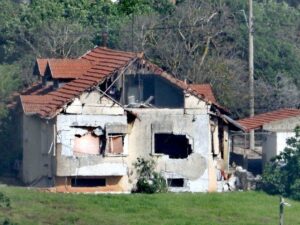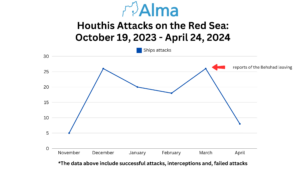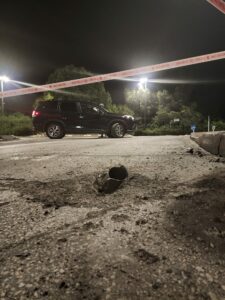Hezbollah’s security unit, epitheted unit 900, actually serves as a “secret police.” The unit is responsible for thwarting espionage carried out against Hezbollah in particular and against Lebanon in general, maintaining the security of Hezbollah’s activities, and monitoring all political, civilian, military, and foreign elements in Lebanon (the institution of the presidency, political parties, politicians and diplomats, UNIFIL, etc.), which may threaten and interfere with Hezbollah’s activities.
The unit is one of Hezbollah’s main power platforms for controlling the effort against intelligence activity by foreign countries throughout Lebanon.
The security unit has access to all state authorities via collaborators in government ministries, the military, and various security bodies (the general security apparatus, the state security apparatus, and the internal security apparatus). The unit also has access to civilian systems, such as Lebanon’s civilian communications infrastructure, seaports, airports, border crossings, hotels, banks, money transfer offices, etc.
The unit operates as an independent body, similar to any counterintelligence body operating in other countries. The primary activities of the unit include:
- Surveilling the organization’s operatives and any other entity in Lebanon that Hezbollah has an “interest” in for any security reasons – (counterintelligence), religious and moral (the surveillance is carried out using the familiar intelligence tools: HUMINT / SIGINT / Webint / OSINT / Cyber, etc.).
- Conducting security debriefings for recruited operatives and Hezbollah collaborators, including security checks into owners of assets and equipment used by Hezbollah for its military infrastructure.
- Polygraph tests.
The commander of the security unit is Khudar Yusuf Nader (خضر يوسف نادر). Originally from the village of Ghandouriyeh. The village is located in the Bint Jabal district in south Lebanon. Nader is also known as “‘Izz a-Din” (عز الدين). He may also be referred to as “Nur ad-Din” (نور الدين). He is surreptitious and has served in his position for many years. Only very few indications regarding his details have become known in recent years.

Hezbollah’s security unit creates significant deterrence among the Shiite population in particular and the general population in Lebanon. When a Shi’ite in Lebanon is asked a direct and clear face-to-face question: “Is there anything more frightening than God?” he will answer directly and clearly: “Hezbollah’s security unit.”
The unit members engage in intimidating Lebanese civilians (of all denominations), including the persecution of journalists who speak out publicly against Hezbollah. This activity includes, in the first stage, “home visits” or a “random” encounter on the street to convey a threatening message. The second stage consists of property damage, and the third stage even deteriorates to kidnappings that include violence and assassination.
Being a Shiite does not grant you immunity if you act as an opposition to Hezbollah. On the contrary, Hezbollah’s security unit acts more aggressively towards “rogue” Shiites. Several Shi’ite journalists were killed, “disappeared,” or forced to leave Lebanon. It is likely that in the event of a decision to assassinate an opponent, it is not members of the security unit who actually carry out the assassination, but members of Unit 121, Hezbollah’s assassination unit. However, the action is carried out only after the “construction of an incriminating file” by the security unit with a recommendation for elimination.
The Lebanese-Shi’ite journalist Nadim Koteich, who comes from the Nabatieh region in south Lebanon, was forced to exile to the Gulf states, courtesy of Hezbollah’s security unit, due to his anti-Hezbollah views.

The Lebanese-Shi’ite journalist Rabih Tlais was abducted and disappeared in December 2020, apparently by Hezbollah’s security unit, after voicing strong opinions against the organization. He turned up sometime later without a satisfactory explanation for his disappearance.

The body of Lebanese-Shi’ite journalist and political activist Luqman Salim was found in his car on February 4, 2021, in the Nabatieh region. Salim was shot and killed by five gunshots fired at his head and body.

An interesting example of recruiting a collaborator is the recruiting of communications aide Jamal Kashmar, head of the communications division of the Lebanese Internal Security Administration by the security unit.

Kashmar passed on data from the communications system to two senior figures from Hezbollah’s security unit: Hussein Hani Beru and Hassan Sami Balut. The security unit’s access to communications data in Lebanon enables it to conduct communications investigations on the objects it monitors, incriminating them.


A document from the Second Lebanon War (2006) indicates the security clearance process implemented by the security unit towards owners of property and equipment used by Hezbollah for its military infrastructure and for Hezbollah’s rental of apartments and businesses in communities in south Lebanon (see “Using Lebanese Civilians as Human Shields,” Appendix A-3, page 198, Intelligence and Terrorism Information Center). Muhammad Ala Hamid Srour from Ayta ash Shab, a Hezbollah prisoner of war during the 2006 war, described how Hezbollah rents houses and apartments. The property is rented after Hezbollah’s security unit approaches the person in charge of the community on behalf of Hezbollah. (The Rabat – see the report we published re: the “Rabat”s in June 2021). The property owner will receive a security clearance after the security unit obtains the opinion of “Rabat,” who is familiar with the property owner.
Hezbollah’s logistics unit and other units use civilian businesses in Lebanon to obtain services and equipment for their military operations. These are usually food products, building materials, fuel, etc. Some of the owners of these businesses are Hezbollah operatives, and some are civilians who have trade relations with Hezbollah. Hezbollah’s security unit is responsible for carrying out the security clearance of civilians who provide these services.
From time to time, there are reports in Lebanon regarding the apprehension of spies allegedly controlled by Israel. From the publications, it can be understood that these are Lebanese from all denominations in Lebanon. The three main bodies currently operating in Lebanon against espionage are Hezbollah’s security unit, the internal security apparatus, and the Lebanese army intelligence. They usually work in cooperation with each other.
Hezbollah’s security unit is not a formal Lebanese state security outfit. The security unit is part of Hezbollah’s informal military and civilian units and organizations operating under the Jihad Council and the Executive Council. They operate parallel to the formal institutions of the Lebanese state. Hezbollah’s military and civilian infrastructures are the dominant ones in Lebanon today.






